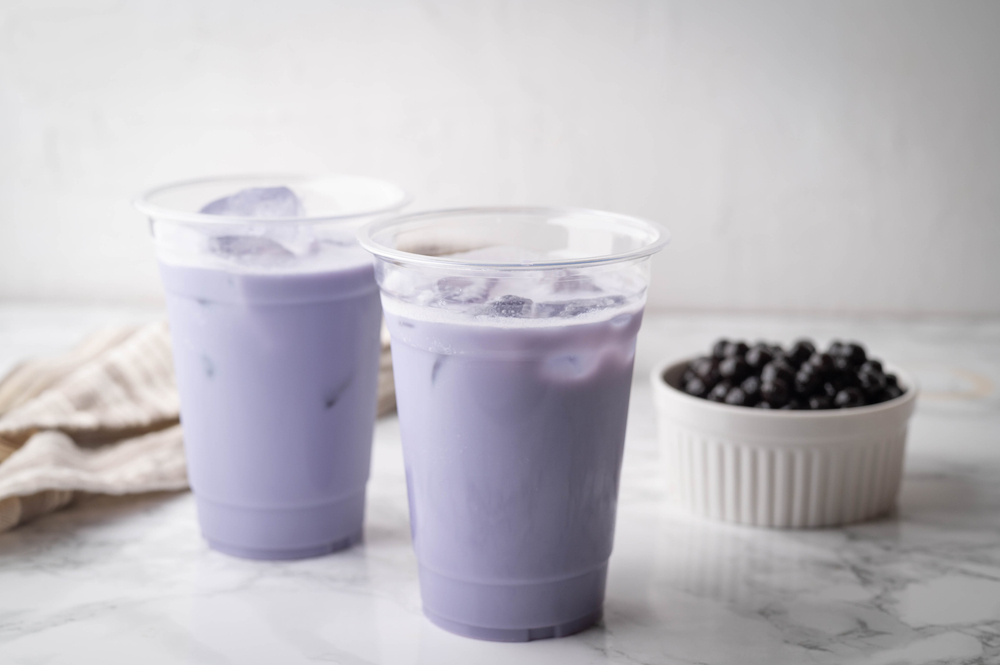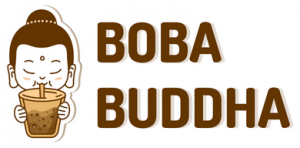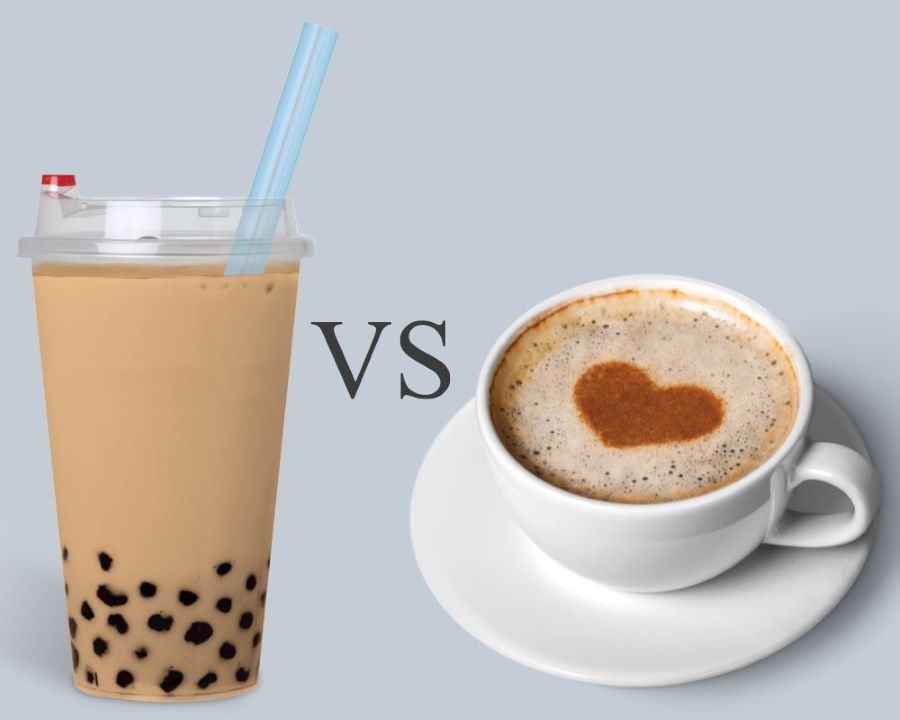Most bubble teas have less caffeine than coffee. However, depending on how the tea is brewed, bubble teas can still have over 50 mg of caffeine per serving. Learn more about caffeine content and how to reduce the amount of caffeine in your bubble tea below.
Caffeine Content
When comparing bubble tea and coffee, there are many factors to consider. The type of tea or coffee, the brewing method, and even the size of the grounds or leaves all change the caffeine content. In general, hot water draws out more caffeine than cool water. The amount of tea or coffee matters, too.
Bubble tea
Bubble tea ranges from 0mg of caffeine to upwards of 80 mg or higher depending on the type of tea used, the amount of tea used, and the brewing time. Matcha tea has the most caffeine, followed closely by Thai and black tea.
| Type of Tea | Caffeine per 8-ounces |
| Matcha tea | 38-176 mg |
| Thai tea | 45-55 mg |
| Black tea | 40-70 mg |
| Oolong tea | 37-55 mg |
| Green tea | 35-45 mg |
| White tea | 15-30 mg |
| Decaf tea | 0-12 mg |
| Herbal tea | 0 mg |
Coffee
The amount of caffeine in coffee varies depending on how it’s brewed and the blend of the coffee used. Cold brew uses one and a half times more coffee grounds than a typical cup of hot coffee, so the caffeine amount in this beverage is typically higher.
| Type of Coffee | Caffeine per 8-ounces |
| Cold brew | 153-238 mg |
| A regular cup of coffee | 80-100 mg |
| One shot of espresso | 60-80 mg (per one ounce) |
| Instant | 62 mg |
| Decaf | 2 mg |
Is Coffee or Bubble Tea Better for You?
The answer depends on what you add to your coffee or bubble tea. Tea is a healthy beverage, full of antioxidants and health benefits. Black coffee is also beneficial. It can help lower the risk of type 2 diabetes, liver disease, and Parkinson’s. The health benefits lessen when other ingredients are added to tea and coffee.
Sugar Content
Bubble teas contain a lot of added sweeteners. They also contain tapioca pearls. While tapioca does provide a few health benefits, it is a source of starchy carbohydrates. Toppings for bubble tea, like jellies or red beans, have more added sugar. The result is often a bubble tea drink high in sugar and carbs.
Coffee, too, can have added sugar. One Starbucks grande coffee drink can contain as many as 60 grams of sugar. Over time, sweetened beverages like coffee and bubble tea can cause blood sugar spikes, eventually leading to Type 2 diabetes.
Caffeine Absorption
The caffeine in coffee is faster acting and can lead to a burst of energy followed by a crash. It can also cause headaches and nausea if consumed in excess.
The caffeine in tea is absorbed more slowly by the body, creating even energy levels for extended periods. However, it is essential to note that each person reacts differently to caffeine and has a different tolerance.
There’s no easy answer, unfortunately. Coffee and bubble tea both have health benefits as long as the finished drink isn’t too high in sugar or carbs. To keep these beverages as healthy as possible, reduce added sweeteners and carbohydrates.
Which Bubble Teas Have No Caffeine?
A few of the most common caffeine-free bubble teas* include:
- Brown sugar latte
- Taro milk tea
- Fruit teas like honeydew, lychee, passion fruit, strawberry, or mango
If you are sensitive to caffeine, you can also choose herbal or white tea as your base. Both of these teas have low amounts of caffeine.
*Each boba tea shop is different. These drinks are typically caffeine-free, but it is always best to ask the barista.

Can You Reduce or Increase the Caffeine Content in Tea?
Ideally, you should keep your caffeine intake under 400 mg per day, roughly no more than four cups of brewed coffee.
There are ways to reduce the caffeine content in homemade tea.
- Steep for a shorter time (for just 1-2 minutes)
- Brew your tea with cold water—hot water releases more caffeine
- Use more water than called for—more water will dilute your tea, making it lower in caffeine
- Use tea bags or whole tea leaves—smaller leaves release more caffeine
- Use your tea bag and 2nd or 3rd time—the 2nd brew has about 70% caffeine of the 1st, and the 3rd use has about 25% of the caffeine of the original brew
You can also increase the amount of caffeine in your tea by reversing the above:
- Steep for a longer time—more than 5 minutes
- Brew with very hot water
- Use small tea leaves
- Add more tea bags—use 2 or 3 instead of just 1
- Reduce the amount of water when you brew your tea
Can You Drink Milk Tea When You’re Pregnant?
Experts agree that pregnant women should limit their daily caffeine intake to below 200 mg of caffeine per day. Caffeine easily crosses the placenta, and babies in the womb cannot metabolize caffeine as adults can, meaning caffeine can build up in their bodies. High levels of caffeine can contribute to low birth weights and restrict fetal growth.
Pregnant women should choose caffeine-free teas or bubble teas with low caffeine. However, some herbal teas are not safe for pregnant women. If you are pregnant, consult your doctor about which teas are safe to drink.

